For many prospective pet parents, the dream of welcoming a furry friend into their home is often tempered by one common concern: shedding. The thought of constant vacuuming, lint rolling, and finding dog hair everywhere can be a deal-breaker. If you’re searching for a compact canine companion that keeps hair shedding to a minimum, you’re in the right place. This comprehensive guide highlights wonderful small house dogs that don’t shed or shed minimally, making them ideal for allergy sufferers, apartment dwellers, or anyone who prefers a cleaner home environment.
Understanding that “non-shedding” doesn’t mean “no maintenance” is key; these breeds often require regular grooming to keep their coats healthy and tangle-free. Let’s explore some of the most charming small breeds known for their low-shedding qualities.
Affenpinscher
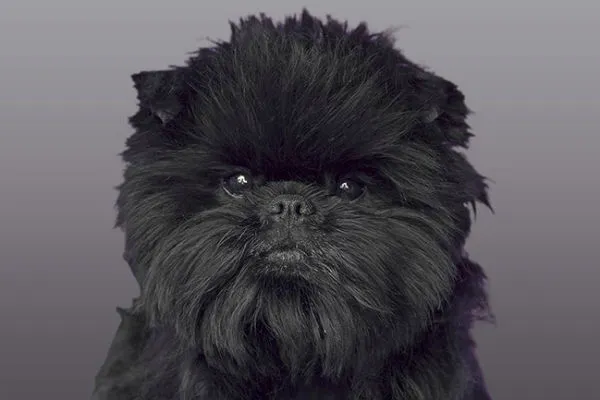 Affenpinscher dog looking alert, a small house dog that doesn't shed much
Affenpinscher dog looking alert, a small house dog that doesn't shed much
The Affenpinscher, whose name translates to “monkey-like terrier,” lives up to its playful moniker with an intelligent and spirited personality. Despite their small stature, these Toy breed dogs are remarkably fearless and make excellent watchdogs, alerting you to any unannounced visitors without leaving a trail of hair. Their wiry, low-shedding coat also boasts the advantage of having almost no “doggy odor,” a significant plus for many owners. A quick twice-weekly brushing with a slicker brush and comb is typically all that’s needed to maintain their shaggy yet neat appearance.
Basenji
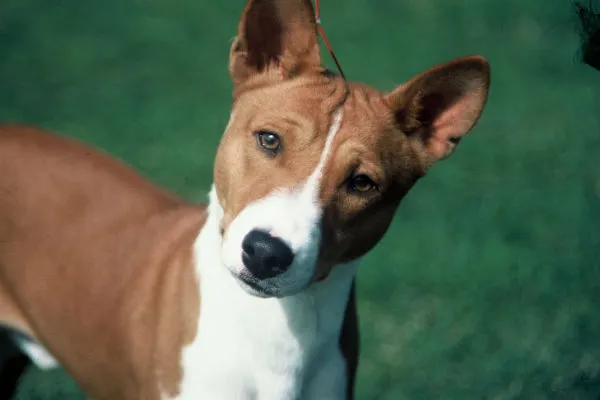 Alert Basenji dog, a small breed with minimal shedding perfect for apartments
Alert Basenji dog, a small breed with minimal shedding perfect for apartments
If you appreciate the elegant nature of hounds but are deterred by their typical shedding and distinctive scent, the Basenji could be your perfect match. This unique small dog breed sheds very minimally, and its short, fine coat is remarkably easy to care for, requiring little more than an occasional brushing. Basenjis are also famously known as “barkless dogs,” making them an excellent choice for apartment living, provided they receive sufficient daily exercise and playtime to satisfy their energetic spirits.
Bichon Frise
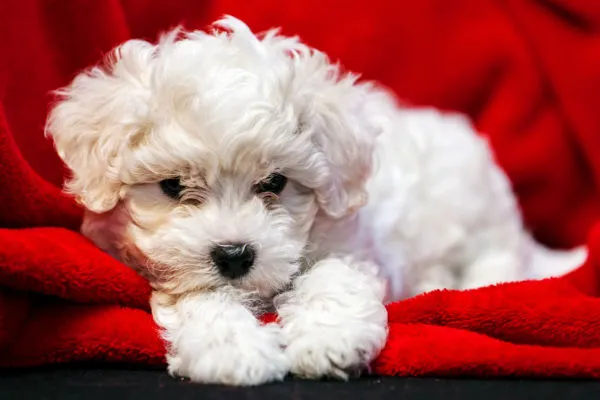 Fluffy white Bichon Frise, a truly non-shedding small house dog for allergy sufferers
Fluffy white Bichon Frise, a truly non-shedding small house dog for allergy sufferers
The Bichon Frise is renowned as a truly non-shedding small dog breed, making them a top choice for individuals with allergies. These cheerful and affectionate dogs bring joy and vibrancy to any home. However, their gorgeous powder-puff coats are not maintenance-free. Their hair grows continuously, necessitating frequent professional grooming appointments, regular brushing at home, and occasional baths to prevent matting and maintain their iconic fluffy appearance. They are truly good small house dogs that don’t shed for families and individuals alike.
Bolognese
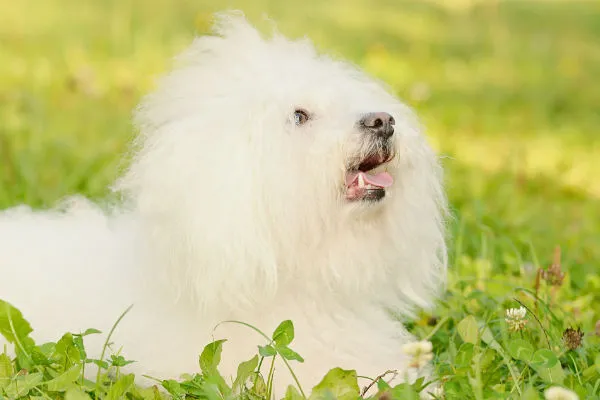 Adorable Bolognese puppy with a fluffy white coat, a non-shedding small house dog
Adorable Bolognese puppy with a fluffy white coat, a non-shedding small house dog
Similar to the Bichon Frise, the Bolognese possesses a distinctive fluffy coat composed of hair rather than traditional fur. This means the Bolognese does not shed, offering a clean living environment. However, their beautiful coats do require diligent care. Daily grooming is essential to brush out any dead hair and prevent tangles, ensuring these lovable lap dogs always look their absolute best. Their calm and devoted nature perfectly complements their low-shedding appeal.
Brussels Griffon
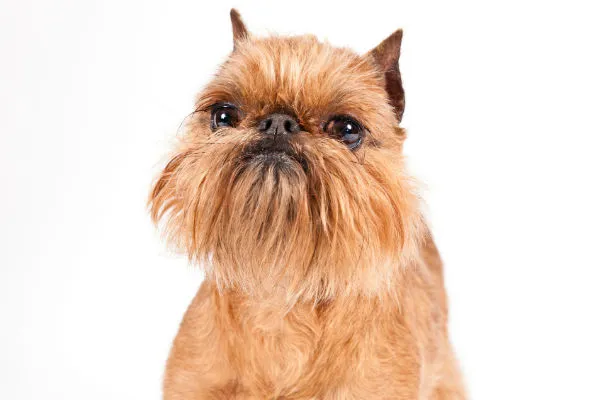 Brussels Griffon with an inquisitive expression, a minimal shedding small dog breed
Brussels Griffon with an inquisitive expression, a minimal shedding small dog breed
Despite their diminutive size, Brussels Griffons are sturdy dogs that don’t demand excessive pampering. Both their smooth-coated and rough-coated varieties are minimal shedders and thrive with regular grooming. Their small size makes them well-suited for various living situations; a daily walk and indoor play are usually sufficient to meet their exercise needs. These loyal and sensitive companions form strong bonds with their families and are happiest in homes where they receive plenty of attention.
Chinese Crested
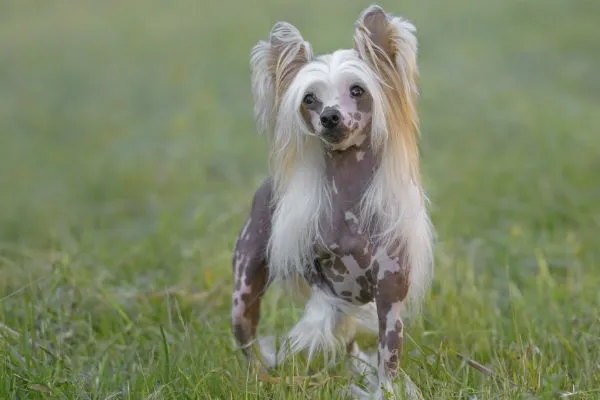 Hairless Chinese Crested dog with distinct tufts, a small house dog that doesn't shed
Hairless Chinese Crested dog with distinct tufts, a small house dog that doesn't shed
For those looking to avoid shedding entirely, the Chinese Crested offers a unique solution. This breed comes in two distinct coat types: hairless and powderpuff. The hairless variety has sparse hair on its head, tail, and feet, making shedding negligible. The powderpuff, by contrast, is covered in a soft, fine coat that sheds very minimally. Hairless dogs require extra attention to their skin, needing protection from sun exposure and cold temperatures, and are more prone to skin irritations, highlighting the importance of a diligent skincare routine.
Coton De Tulear
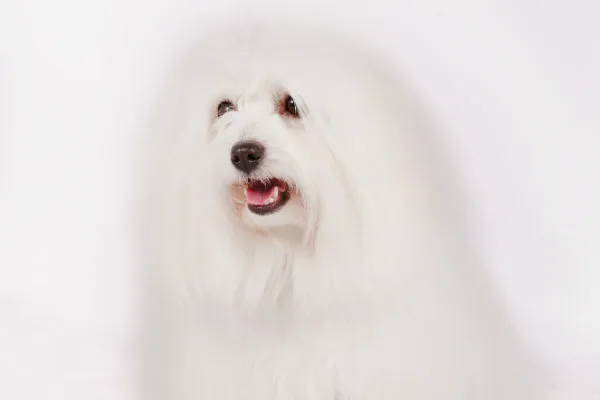 Coton de Tulear with a long, soft white coat, a non-shedding and hypoallergenic small dog
Coton de Tulear with a long, soft white coat, a non-shedding and hypoallergenic small dog
The Coton de Tulear is celebrated for its distinctive, long, and fluffy coat, which is considered hypoallergenic. This makes them an excellent choice for individuals with allergies and those seeking a small dog that doesn’t shed. Their lighthearted and gentle disposition makes them wonderful companions, and while their coats do require daily grooming to prevent matting, the effort is well worth it for their charming personality and beautiful appearance.
Havanese
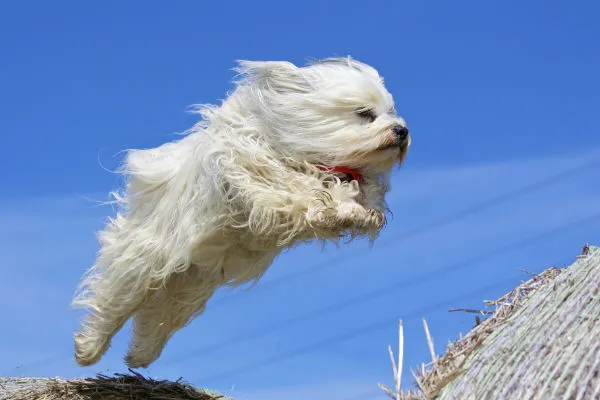 Playful Havanese dog with a long, silky coat, a small house dog that doesn't shed
Playful Havanese dog with a long, silky coat, a small house dog that doesn't shed
These vibrant “National Dog of Cuba” are cherished for their spunky charm and their non-shedding coats, which translates to less time spent cleaning up hair and more joyful moments playing with your spirited Havanese. Their silky, flowing coat requires weekly brushing and regular baths to keep it clean, healthy, and free of tangles. The Havanese are adaptable and affectionate, thriving on companionship and bringing boundless energy to their human families.
Maltese
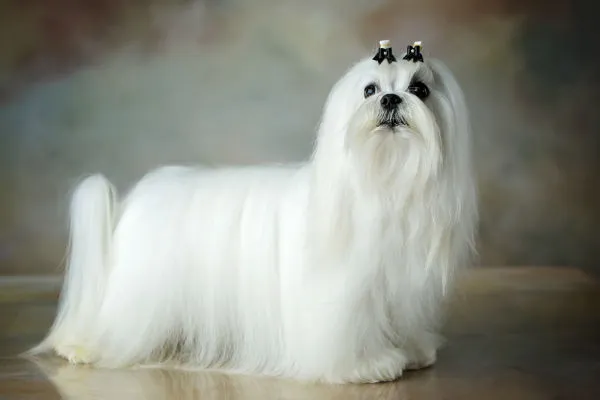 Elegant Maltese dog with flowing white hair, a small non-shedding lap dog
Elegant Maltese dog with flowing white hair, a small non-shedding lap dog
Maltese dogs have captivated hearts for three millennia, largely due to their enchanting presence and minimal shedding. This ancient dog breed from Malta boasts a long, pure white coat that sheds very little, solidifying their status as ideal lap dogs. While shedding is minimal, their luxurious coats demand consistent care. Regular brushing is crucial to prevent mats from forming, and occasional baths are necessary to keep their long, silky hair pristine and free from dirt or debris.
Lhasa Apso
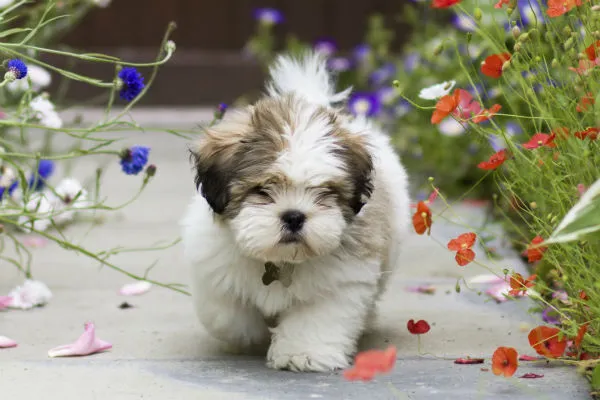 Lhasa Apso with a distinctive long coat, a non-shedding small companion dog
Lhasa Apso with a distinctive long coat, a non-shedding small companion dog
Originating from the mountains of Tibet, the Lhasa Apso is a small dog breed that makes an exceptional companion. They possess a delightful blend of calmness and playfulness, enjoying brisk walks as much as they do relaxing on their owner’s lap. Lhasa Apsos do not shed, but their magnificent coats require dedicated maintenance. Many owners opt for a shorter “puppy cut” to simplify daily grooming and brushing of their long, flowing hair, making them one of the easier small dogs that don’t grow and don’t shed to care for in terms of coat length.
Miniature Schnauzer
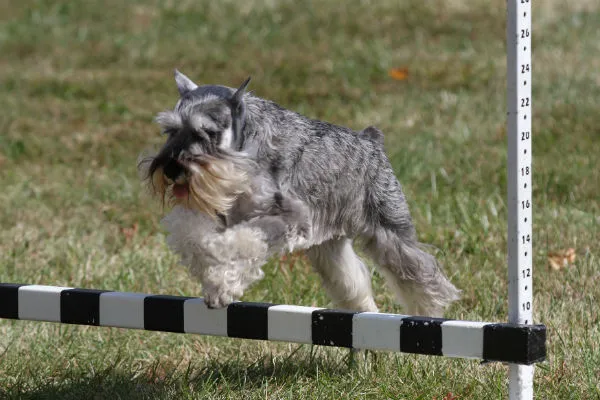 Alert Miniature Schnauzer, a smart and low-shedding small terrier breed
Alert Miniature Schnauzer, a smart and low-shedding small terrier breed
The Miniature Schnauzer is a bright, easily trainable, and cheerful little dog, bearing a strong resemblance to its larger Standard Schnauzer cousin. This robust Terrier breed sheds very little, making it a favorable choice for those sensitive to dog hair. Their adaptability allows them to be equally content in bustling city apartments or sprawling country homes, as long as they are close to their human companions. To keep a Miniature Schnauzer looking its best, weekly brushing and regular professional grooming are essential components of their care routine.
Poodle (Toy & Miniature)
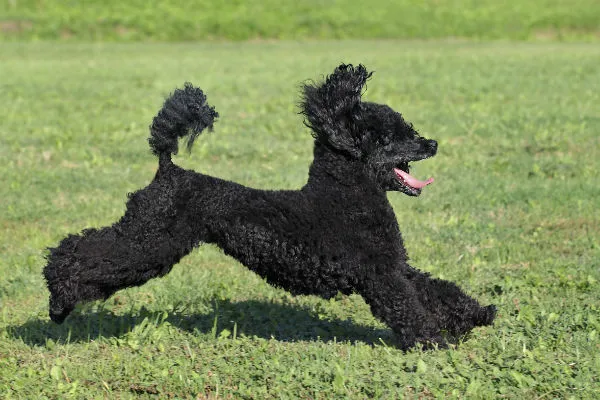 Miniature Poodle with its signature curly coat, a popular non-shedding small house dog
Miniature Poodle with its signature curly coat, a popular non-shedding small house dog
When thinking about pictures of small dogs that don’t shed, Poodles are often the first breed that comes to mind, and for good reason. Poodles are famously non-shedding and hypoallergenic, making them an excellent choice for allergy sufferers. Both Miniature and Toy Poodles offer these desirable qualities in a petite, intelligent package, differing only in size from their Standard counterparts. All Poodles are highly intelligent and eager to please, making them relatively easy to train. Their distinctive curly coats, however, do require consistent professional grooming and regular brushing to prevent matting and maintain their iconic look.
Scottish Terrier
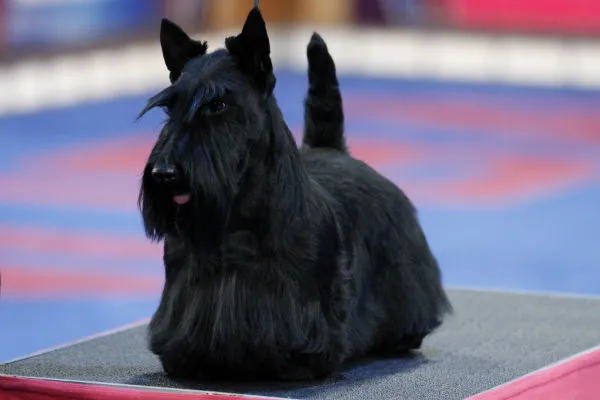 Bold Scottish Terrier with a wiry black coat, a low-shedding small dog with a big personality
Bold Scottish Terrier with a wiry black coat, a low-shedding small dog with a big personality
The Scottish Terrier, affectionately known as a Scottie, is a Terrier breed characterized by its boldness, confidence, and surprisingly big personality for its size. Their wiry, weather-resistant double coat sheds very minimally. While low-shedding, Scotties do require regular brushing, professional grooming, and occasional hand-stripping to keep their coats healthy and preserve their distinctive breed outline. Scotties are clever and independent dogs with a strong prey drive, which owners should be mindful of around smaller pets.
Shih Tzu
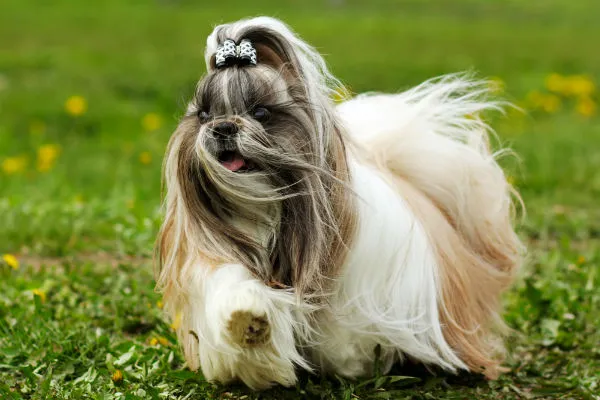 Regal Shih Tzu with long flowing hair, a charming non-shedding small house dog
Regal Shih Tzu with long flowing hair, a charming non-shedding small house dog
The Shih Tzu boasts a long and storied history, once being the favored house pet of the Tang Dynasty. These “little lion dogs” come in a myriad of colors and patterns. Their long, silky hair is very low-shedding and presents a regal appearance when brushed out, truly befitting their royal ancestry. This Toy breed is sturdy and lively, with a confident carriage often described as arrogant due to their proudly held heads and curling tails. Bred purely as companions, their gentle and trusting nature makes them exceptional small house dogs.
West Highland White Terrier
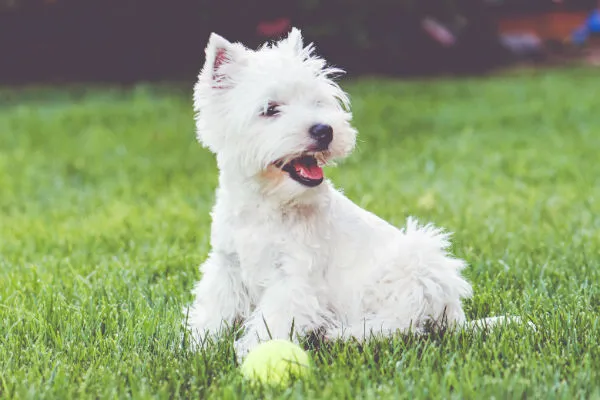 Curious West Highland White Terrier, a low-shedding small house dog with a white coat
Curious West Highland White Terrier, a low-shedding small house dog with a white coat
The coarse, brilliant white coat of the West Highland White Terrier, or “Westie” as they are fondly called, sheds very little. These sturdy little dogs are intelligent, loyal, happy, and immensely entertaining. Westies are naturally curious with moderate energy levels and possess the independent streak common among all Terriers, which can present a delightful challenge during training. Their low-shedding coat makes them a fantastic option for neat homes.
Xoloitzcuintli
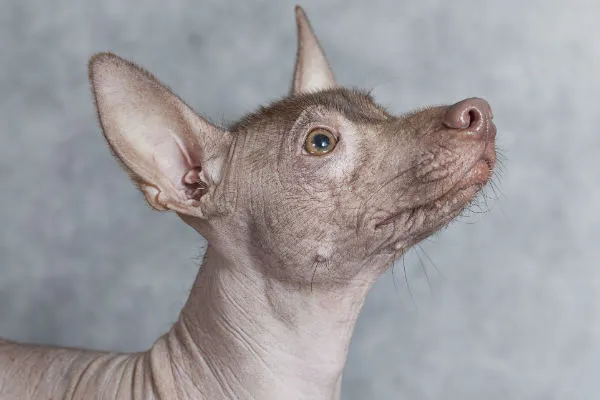 Hairless Xoloitzcuintli dog, an ancient and minimal-shedding small breed
Hairless Xoloitzcuintli dog, an ancient and minimal-shedding small breed
Also known as the Mexican Hairless dog, the Xoloitzcuintli is an ancient and relatively rare breed that can be found in either hairless or coated varieties. The hairless Xolo retains only a small amount of hair on its head, while the coated variety has a very short, fine coat that sheds minimally. Similar to the Chinese Crested, hairless Xolos require additional attention to their skin for protection against the elements. Xolos are attentive watchdogs and affectionate companions, known for their tranquil demeanor at home, despite enjoying physical activities like walks and vigorous play.
Yorkshire Terrier
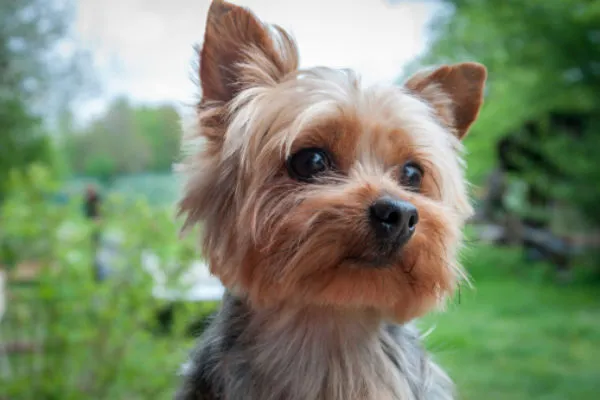 Sprightly Yorkshire Terrier with silky hair, a popular non-shedding small house dog
Sprightly Yorkshire Terrier with silky hair, a popular non-shedding small house dog
Sprightly, full of character, and affectionate, the Yorkshire Terrier, commonly known as a Yorkie, is a Toy breed brimming with personality. These spunky lap dogs are incredibly popular, and for good reason. Yorkshire Terriers do not shed, and their beautiful, silky coats are stunning when brushed out daily, a task made easy by their small size. Don’t let their regal appearance fool you—Yorkies have working-class roots, having once hunted rats in English clothing mills. Today, they are just as content cuddling on their owner’s lap as they are exploring their surroundings.
Important Considerations for Non-Shedding Small Dogs
While these breeds offer the benefit of minimal to no shedding, it’s crucial to remember that “non-shedding” does not equate to “no maintenance.” Many of these dogs possess hair-like coats that continuously grow, much like human hair. This means they require regular professional grooming, including haircuts and trims, along with consistent at-home brushing to prevent matting, maintain coat health, and ensure comfort.
Choosing the right non-shedding small dog involves more than just their coat. Consider their temperament, exercise requirements, and how well they’ll fit into your lifestyle and living space. Research each breed thoroughly to find a companion that aligns perfectly with your family’s needs and activity levels. Always prioritize purchasing a dog from a reputable breeder or considering adoption from a responsible rescue organization to ensure a healthy and well-adjusted pet.
The world of small to medium dog breeds that don’t shed is vast and full of delightful choices. By understanding their unique grooming needs and personalities, you can find a loyal, low-shedding companion that brings immense joy to your home without the constant worry of excessive hair. Explore more of our dog care guides to deepen your knowledge and make the best decision for your future furry family member!
